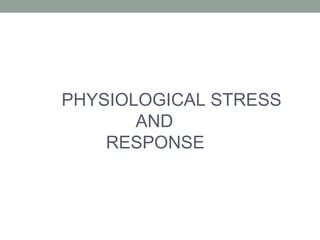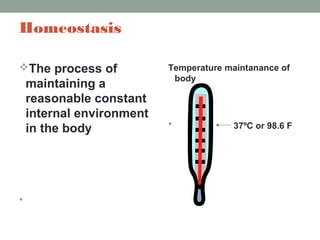This document discusses physiological stress and the body's response. It defines stress as pressures or demands (stressors) that force a response from the body. The stress response is an innate reaction to maintain homeostasis. Stressors can be physical, chemical, biological, or environmental events that disturb homeostasis. The body responds to acute (short-term) and chronic (long-term) stress differently. The nervous, endocrine, and immune systems are involved in the stress response. Repeated exposure to stress hormones can damage brain tissue and increase aging. Stress can indirectly cause physical illness by changing health behaviors like smoking or directly by suppressing the immune system. Both behavioral and physiological factors link stress to disease.















